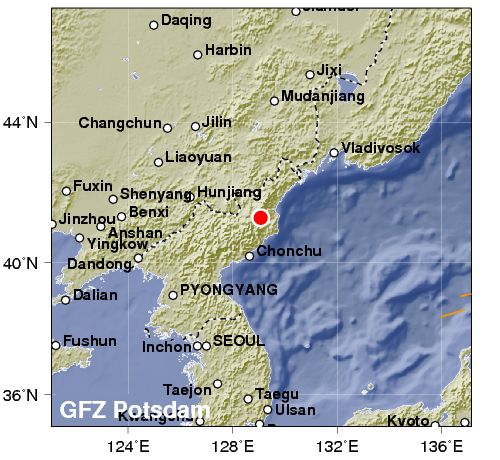Information about hydrogen bomb test in North Korea derived from seismological observations

This is a product of the GEOFON Extended Virtual Network (GEVN) and credit belongs to all involved institutions.
Seismic signals from explosions are different from those observed in case of earthquakes showing particular features that allow seismologists to distinguish between the two.
Information about probable hydrogen bomb test in North Korea derived from seismological observations
06.01.2016: A very shallow seismic event was detected this morning in North Korea near Punggye-ri. The automatic GEOFON notification system at the GFZ German Research Centre for Geosciences has calculated and notified a few minutes after the origin time at 01:30:01 UTC time (10:00 Pyongyang time) a magnitude of M 5.3 for this event. The location of the event is almost the same as the previous known explosions in 2013 and 2009.
Seismic signals from explosions are different from those observed in case of earthquakes showing particular features that allow seismologists to distinguish between the two. The similarity of the waveforms, the shallow depth and the almost identical location with respect to the previous events in 2013 and 2009 are indicating that also the source of this event is an explosion. A comparison with the measurements from 2009 und 2013 shows a larger magnitude of the 2016 test.
The GEOFON station of GFZ at Flechtingen in Germany recorded the event eleven minutes after the origin time in a seismogramme:
https://media.gfz-potsdam.de/gfz/wv/05_Medien_Kommunikation/Bildarchiv/Einzelbil…
Station in China: https://media.gfz-potsdam.de/gfz/wv/05_Medien_Kommunikation/Bildarchiv/Einzelbil…
The location is found here:
http://geofon.gfz-potsdam.de/eqinfo/event.php?id=gfz2016ajgm
The GEOFON-event parameters of the explosions from 2009, 2013 und 2016 may be found here:
http://geofon.gfz-potsdam.de/eqinfo/list.php?latmin=41&latmax=42&lonmin=…
Media Contact
All latest news from the category: Earth Sciences
Earth Sciences (also referred to as Geosciences), which deals with basic issues surrounding our planet, plays a vital role in the area of energy and raw materials supply.
Earth Sciences comprises subjects such as geology, geography, geological informatics, paleontology, mineralogy, petrography, crystallography, geophysics, geodesy, glaciology, cartography, photogrammetry, meteorology and seismology, early-warning systems, earthquake research and polar research.
Newest articles
Faster, more energy-efficient way to manufacture an industrially important chemical
Zirconium combined with silicon nitride enhances the conversion of propane — present in natural gas — needed to create in-demand plastic, polypropylene. Polypropylene is a common type of plastic found…

Energy planning in Ghana as a role model for the world
Improving the resilience of energy systems in the Global South. What criteria should we use to better plan for resilient energy systems? How do socio-economic, technical and climate change related…

Artificial blood vessels could improve heart bypass outcomes
Artificial blood vessels could improve heart bypass outcomes. 3D-printed blood vessels, which closely mimic the properties of human veins, could transform the treatment of cardiovascular diseases. Strong, flexible, gel-like tubes…





















